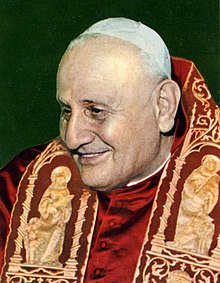For the most part Roman Catholic theology has
shied away from fundamentalism, but when it has fallen into the mire of literal
interpretation of scripture the results have been disaster. The worst of course
is the reading of the New Testament as blaming the Jews for Jesus crucifixion
by the Romans. A root cause of the
holocaust is distorted Christian theology.
An editorial in the National Catholic Reporter “US church leadership is in transition” (NCR, Dec. 4-17, 2015) urged
U.S. bishops to get in line with the leadership of Pope Francis. In support of the argument, NCR resorts to a
fundamentalist analysis:
"Francis’ approach should have the
ring of familiarity to anyone who wanders through the stories of our sacred
texts and is taken with Jesus’ risky encounter with the masters of law of his
own time."
I am not a
scripture scholar, but I find the NCR use of the “sacred texts” troubling.

Vatican II document “Nostra Aetate” (1965)
states:
"Although the Church is the new people
of God, the Jews should not be represented as rejected by God or accursed, as
if that follows from Holy Scripture." #4
Despite
Vatican II and “Nostra Aetate,” the NCR editorial is an indication that there
still is a problem. I have heard many
homilies that underline the gospels narrative of Jesus’ antipathy to the Pharisees
indicating a “risky” clash of ideas.
The
gospels are not historical works but an interpretation of Faith with a prime reference
to Jesus of Nazareth. After the destruction of the Temple by the Romans (70 C.E.),
the gospel writers found themselves in competition with the rabbinic
movement. Which Jewish sect would
prevail? Originally the Jesus vs. “masters
of the law” stories in the New Testament may have been simply rough politics. After Emperor Constantine’s Council of Nicaea
(325 C.E.) declared Jesus God and man, politics moved to dogma.
 |
| Add c"Rome-Capitole-StatueConstantin" by I, Jean-Christophe BENOIST. Licensed under CC BY 2.5 via Commons - https://commons.wikimedia.org/wiki/File:Rome-Capitole-StatueConstantin.jpg#/media/File:Rome-Capitole-StatueConstantin.jpgaption |
What
do we know about the historical Jesus’ attitude towards the law of his faith? Jesus
as an associate of John the Baptist may have been a strong advocate of the importance
of the law. The Gospel of Matthew relates
the story of Jesus the law giver – he places stronger demands than people are
accustomed to, and he also said, “till heaven and earth disappear, not one dot,
not one stroke will disappear from the law.” (Mt. 5) Discussions and debates about the law are not
uncommon among rabbis; to say that they were “risky” requires fundamentalist
conflation with the passion stories.
Then there is the story in all three
synoptic Gospels of Jesus’ encounter with “masters of the law” (Mk. 12:28-34,
Lk. 10:25-28, Mt. 22:34-40). The
question was “What is the greatest commandment of the Law?” All agreed – “God is one - love God and your
neighbor as yourself.” (Duet. 6:4, - Lev. 19:18) Jesus and his disciples would have had this
memorized since childhood. The story has
a ring of truth.
In consideration
of politics of the present - again “Nostra Aetate” #3…
"Although in the course of centuries
many quarrels and hostilities have arisen between Christians and Moslems, this
most Sacred Synod urges all to forget the past to strive sincerely for mutual
understanding. On behalf of all mankind,
let them make common cause of safeguarding and fostering social justice, moral
values, peace, and freedom."
 |
| Benito_Mussolini_Face.jpg (200 × 303 pixels, file size: 13 KB, MIME type: image/jpeg) |
It’s a sad situation; if it is acceptable
for liberals to refer to questionable stories to support their cause, why not give
the same license to conservatives to condemn some other Semitic people who might
be Muslims? Pius XI in tearfully lamenting
Mussolini’s anti-Jewish laws, and perhaps his own complicity, recognized that, with
Abraham as father, “Spiritually we are all Semites.” *
 |
| Pope John XXIII |
And therefore the narrow-minded racism of
contemporary politics prompts us to remember Pope John XXIII’s Vatican II. (1962
– 1965) The Council emphasized ecumenism
– the universality of humankind - during the most dangerous part of the cold
war. Perhaps this was an important
reason the world survived. Current times
demand a revived ecumenism if we are to survive the new surge of nationalism
and violence based at least partly on religious fundamentalism. The closing of the Chanukah celebration
provides a lesson for all from the Jewish Scriptures: “Not by might, nor by
power, but by my spirit said the Lord of Hosts.” Zechariah 4: 1-7.
*David I. Kertzer, The Pope and Mussolini, Random
House, New York, 2014, p. 120
No comments:
Post a Comment